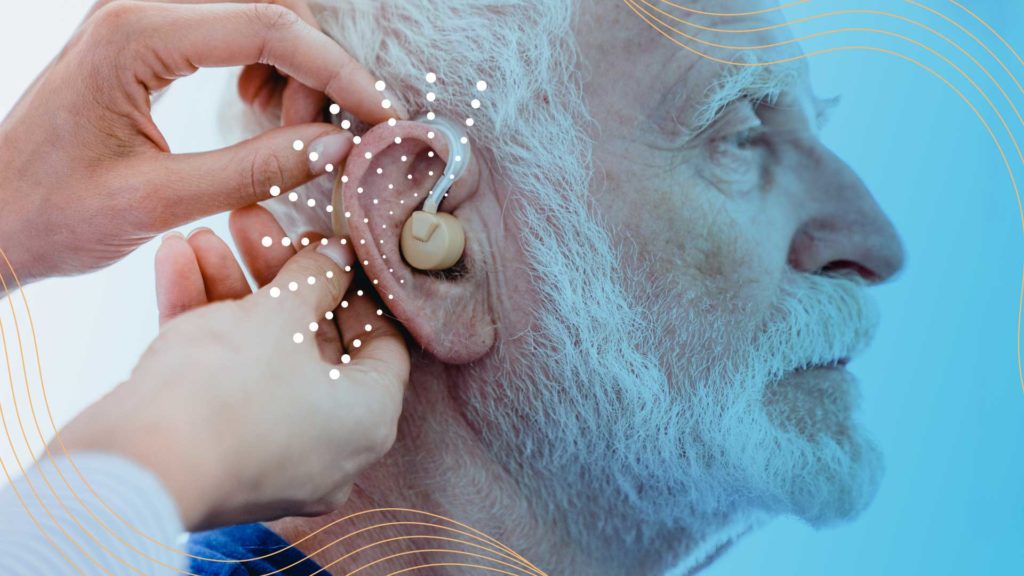
Some of the links on this page may link to our affiliates. Learn more about our ad policies.
Best Hearing Aids of 2023
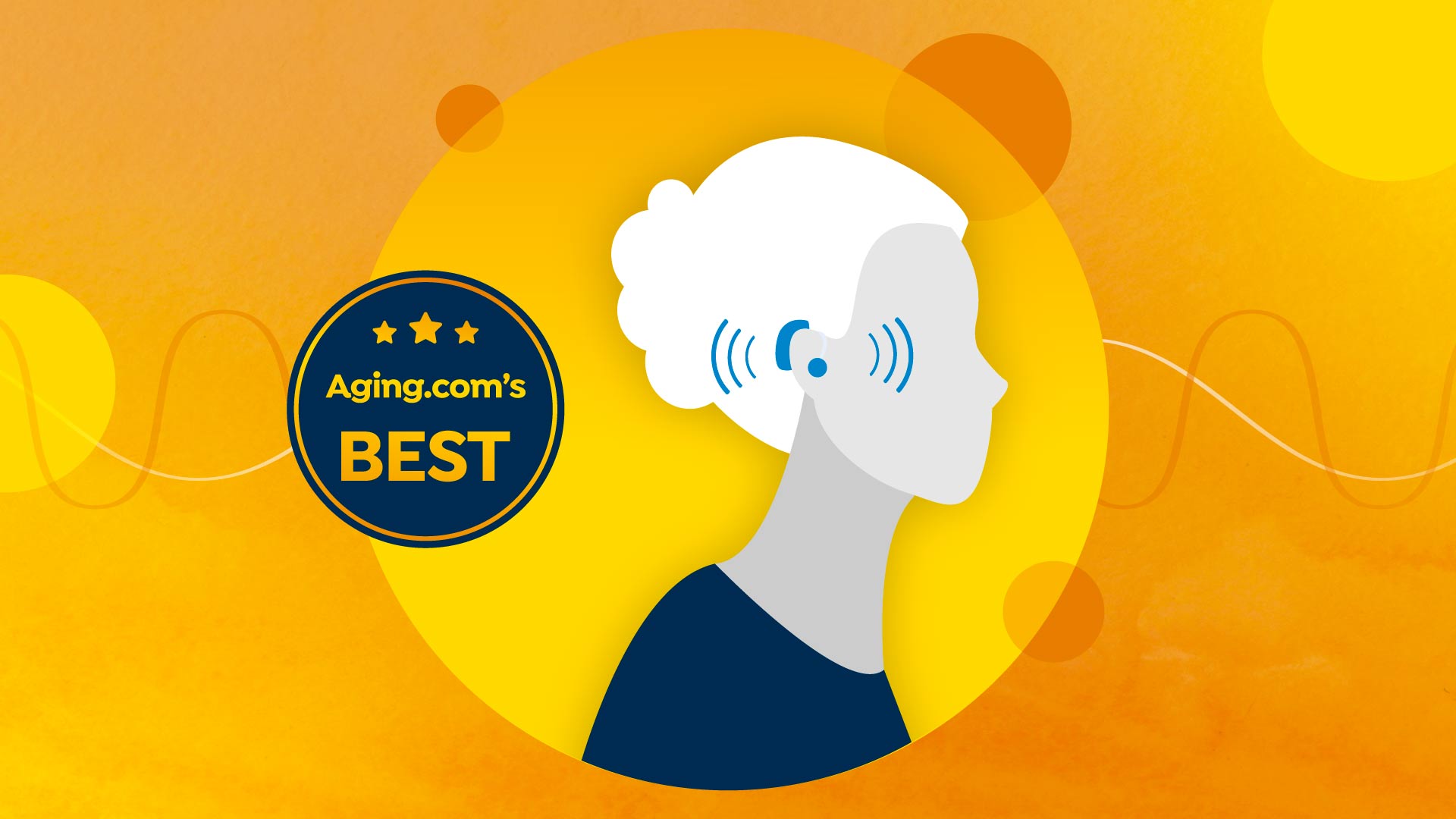
BEST FOR TINNITUS
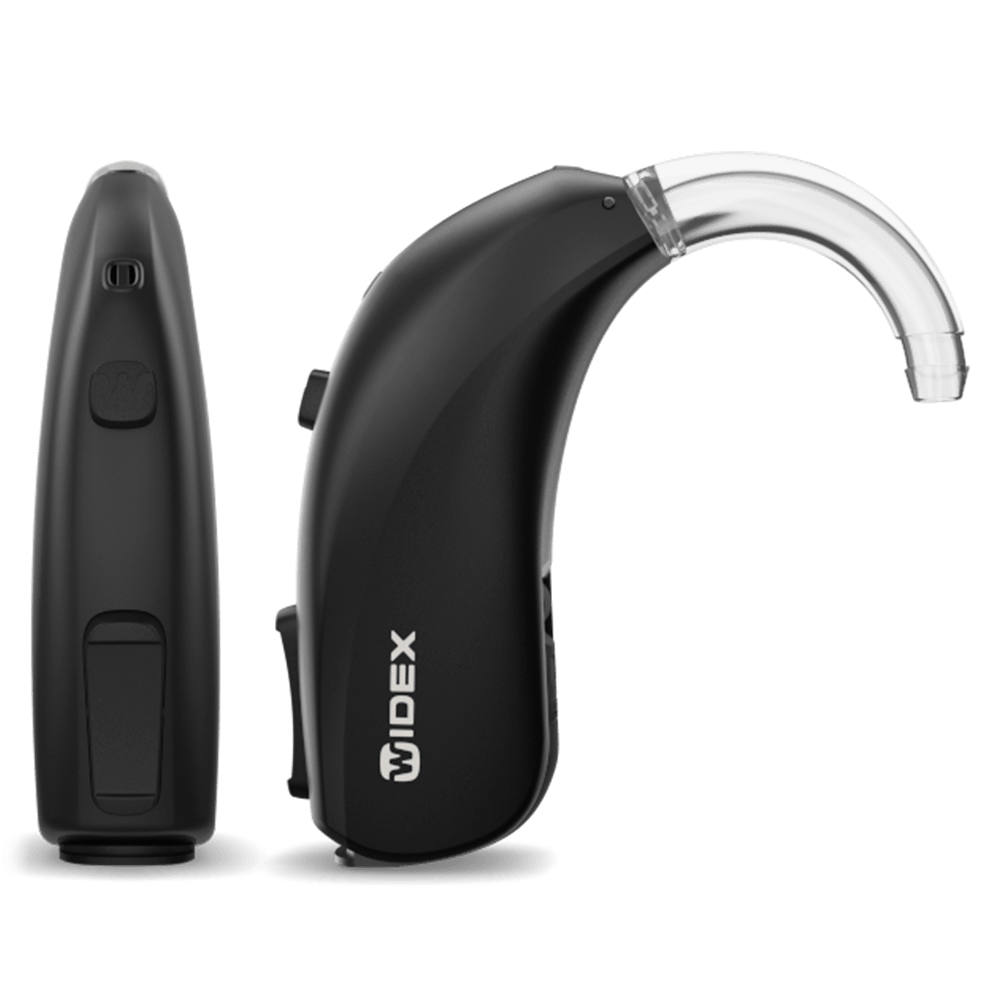
WIDEX MOMENT
- Comfortable fit
- Traditional battery
- Uses sound therapy technology
BEST BUDGET-FRIENDLY
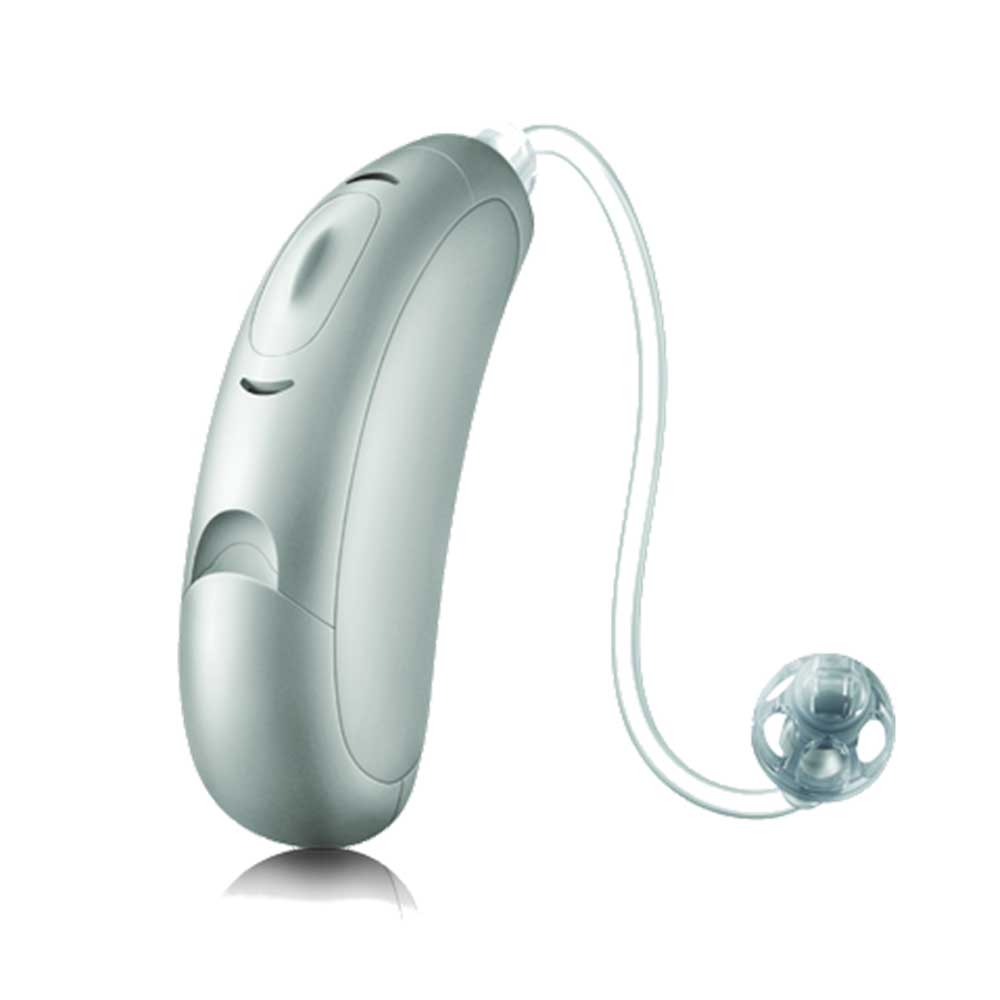
AUDICUS DIA II
- Fits behind the ear
- Filters out background noise
- Traditional battery
BEST FIRST TIME
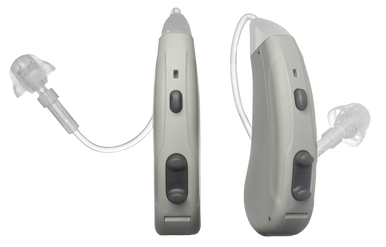
LEXIE LUMEN
- Runs on zinc 312 battery
- Fits behind the ear (BTE)
- One time cost of $799
Hearing loss is a common problem that occurs as we age. It’s estimated that one in three people between 65 and 74 have some level of hearing loss. The statistics jump to one out of two people have difficulty hearing over the age of 75.
What Causes Hearing Loss?
For many, hearing loss is just part of growing older. But there are several factors that can cause you not to hear as well as you once did. Hearing loss occurs when there is damage to the ear. Often the nerve cells that send sound signals to the brain become damaged and don’t work correctly.
Damage can happen from loud noises. Over time, noise from heavy machinery, lawnmowers, snow blowers, or even loud music can cause hearing loss.
An infection, pressure or putting something in your ear can puncture your ear drum and lead to hearing loss. Earwax and fluid buildup can also affect your hearing.
Diabetes, high blood pressure, viruses, bacteria, certain heart conditions, strokes, tumors, or a brain injury can lead to hearing loss. Ototoxic medications used to treat cancer, heart disease, and serious infections can also cause problems.
Best Hearing Aids for 2023
- Best Hearing Aid for Tinnitus – Widex Moment
- Best Budget-Friendly Hearing Aid – Audicus Dia II
- Best for Safety Features – Starkey Evolv AI
- Best for Profound-to-Severe Hearing Loss – Phonak Naida Paradise
- Best Rechargeable Hearing Aids – ReSound One
- Best First-time Hearing Aids – Lexie Lumen
- Best Invisible Hearing Aids – Eargo Neo HiFi
- Best for Mild-to-Moderate Hearing Loss – Lively 2 Pro
| Brand | Rating | Cost | Doctor’s Visit Required | Online Hearing Test | Risk-Free | Financing Available |
|---|---|---|---|---|---|---|
| Audicus | |
$499 | ||||
| Widex | |
$1,950 | ||||
| Lexie | |
$799 | ||||
| Lively | $1,995 | |||||
| Starkey | $2,800 | |||||
| Phonak | $2,400 | |||||
| ReSound | $1,250 | |||||
| Eargo | $2,500 |
What Are the Different Types of Hearing Loss?
When choosing the best hearing aids for you, it’s important to know what is causing your hearing loss. Doctors categorize it into three basic types – conductive hearing loss, sensorineural hearing loss (SNHL) and mixed hearing loss.
Conductive Hearing Loss
This type of hearing loss happens when sound from the outer ear can’t travel to the eardrum and middle ear. Conductive hearing loss makes it difficult to hear soft or muffled sounds. This type isn’t always permanent and can sometimes be treated with antibiotics or surgery.
Sensorineural Hearing Loss (SNHL)
Damage to your inner ear or the nerves to the brain can result in SNHL. This type of hearing loss makes loud or normal sounds seem muffled and is usually permanent.
Mixed Hearing Loss
Mixed hearing loss is the combination of SNHL and conductive hearing loss at the same time.
How Do I Know I Need Hearing Aids?
As we age, hearing loss becomes an increasing problem. But because hearing loss is often gradual, it’s hard to know if it’s time to seek help or if the trouble or experience is temporary.
If you’re experiencing any of the following issues, the Centers for Disease Control and Prevention recommends being evaluated for hearing aids:
- Trouble hearing people you are talking to on the phone
- You find yourself continuing to turn up the volume on your TV or phone
- You are experiencing ringing in your ears that doesn’t go away
- Certain sounds are hard to hear or are muffled
- Having to frequently ask others to repeat what they have said
- Difficulty understanding and participating in conversations, especially in noisy environments
- You experience an increased sensitivity to certain sounds, or if those sounds cause you pain
How Do I Get Hearing Aids?
Once you decide you might need hearing aids, the next step is to call your doctor and make an appointment. Don’t ignore your symptoms, because doing nothing will cause things to become worse. At your appointment, your primary care physician will do an initial assessment of whether you need hearing help. After asking you some questions and giving your ears a physical exam, they may conduct a hearing test or send you to an audiologist for one.
The test is conducted in a sound-proof room, doesn’t take long and it is painless. You’ll likely be asked to wear earphones and listen to some short tones. They will be played at different pitches and volumes in one ear at a time. What you hear will help your doctor know if you are struggling with hearing high-pitched, low-pitched, quiet, or loud sounds and if you are experiencing hearing loss in one or both ears.
You may also undergo a tuning fork test (also called Rinne’s or Weber’s test) where a two-pronged, metal instrument is used. The doctor will hit the fork against his/her knee or elbow and place it in the middle of your forehead. They’ll ask which ear you hear the noise in the loudest. The doctor may also put the fork to the bone near your ear and ask you the same question.
Once your hearing loss is determined, your doctor or audiologist can recommend and fit you for the type of hearing aids you want and need. You don’t have to purchase hearing aids from your doctor – they are sold at warehouse clubs like Costco, as well as through online hearing companies.
What Are the Different Styles of Hearing Aids?
There are different types of hearing aids. All of them work to give you hearing support. The type you choose is generally based on your own preferences for fit, feel and look.
In-The-Ear Hearing Aids (ITE)
As the name implies, these fit inside the ear canal. Your doctor will take an impression of your ear canal for a custom fit. You can often get these types in different skin tone colors to blend in.
Behind-The-Ear Hearing Aids (BTE)
BTEs sit on top or behind the outer part of the ear. They have tubing that carries sound down into your ear canal without blocking off the entire opening. You can have a custom-fit ear mold or a dome style BTE. They are also often available in different colors.
In-The-Canal Hearing Aids (ITC)
ITCs sit in the lower part of the outer ear bowl and are discreet.
Low-Profile Hearing Aids
These are similar to ITC hearing aids. They are larger in size and fill either half or all the outer ear bowl, depending on which one you choose.
Receiver-In-The-Ear Hearing Aid (RITE)
The RITE is a popular style. It can either sit in the canal or in the outer bowl and has a speaker that rests in your ear canal.
Hearing aids can either be analog or digital. Analog models make sounds louder by converting them into electrical signals. They have simple controls and are generally less expensive.
Digital hearing aids amplify sound by converting it into codes similar to computer codes. The code determines what direction the sound is coming from, as well as its pitch and volume.
Best Hearing Aids of 2023
There are so many hearing aid brands on the market it can be difficult to choose one. The research can become overwhelming, so we’ve narrowed down our list of the best ones for different situations. We took into account price, availability, features, battery life, as well as reviews from verified customers. Here’s our recommendations for the best hearing aids:
Audicus Dia II
-
Overall Rating4.5/5
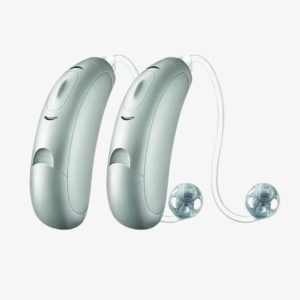
- No need for a doctor’s visit
- Changes performed remotely
- Rechargeable and traditional battery models
- 45-day, money-back guarantee
- One-year warranty
- Financing available
Cost
Dia II – $499/single; $998/pair
Overview
Audicus is an online hearing aid retailer that operates on a direct-to-consumer model. You can buy hearing aids online from Audicus, without seeing a doctor. All you’ll need to do is take a hearing test online and decide which hearing aids you want. They will then be shipped to your home customized and programmed for your specific needs. They can also make any adjustments you need remotely by a licensed Audicus audiologist.
The company sells six different hearing aid types that can fit behind the ear or inside your ear canal, all equipped with a variety of features, including Bluetooth technology. All Audicus hearing aids are good choices, but the Dia II is our pick for best budget-friendly model. For less than $1000, you can get a behind-the-ear model that filters out background noise and adapts to your environment.
Widex Moment
-
Overall Rating4/5
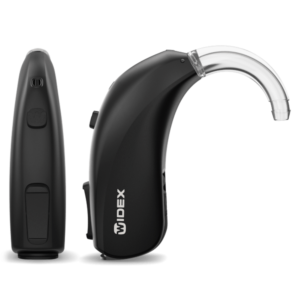
- Must visit authorized, licensed hearing professional
- Not available online
- Rechargeable and standard battery models
- 3-year warranty
- No-obligation trial
- Financing available
Cost
Widex Moment – $1,950-$3,600/pair
Overview
Widex has one of the biggest selections of hearing aids you will find. It sells about 30 models with 15 different compatible accessories. Widex has a hearing test online but will not selling hearing aids to directly you. The company believes in-person fitting and customization is best, so it requires you to see an authorized licensed hearing professional.
All Widex models are good choices to treat hearing loss, but if you suffer from tinnitus, the Widex Moment is our pick for a hearing aid. It uses sound therapy to help manage the symptoms of tinnitus and is often touted for its naturalistic sound.
Lexie Lumen
-
Overall Rating4/5

- No doctor visit required
- Operates on traditional batteries
- Payment plan available
- One-year warranty
- 45-day return policy for full refund
Cost
Lexie Lumen – $799 or $49/month for two years
Overview
Lexie only offers one hearing aid to consumers. It’s called the Lumen and you can buy it without a recommendation from a doctor. You can buy the hearing aids online from Lexie or at participating Walgreen’s in Arizona, Colorado, North Carolina, Tennessee, and Texas.
The company has an online hearing test you can take. If you decide the Lumen is right for you, the app will walk you through how to set up the device. You can also check your battery level, make adjustments and talk to a hearing expert through the app. It’s a good choice for those who are in the early stages of hearing loss and need an inexpensive way to hear better.
Lively 2 Pro
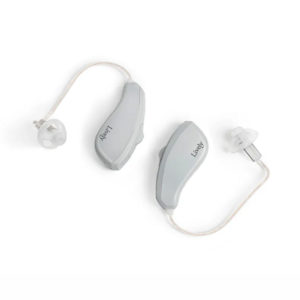
- Rechargeable and traditional battery options
- 100-day, risk-free trial
- No doctor visit required
- Financing option available
- 3-year warranty
Cost
Lively 2 Pro – $1,995 or $65/month
Overview
Lively sells its hearing aids online – no doctor visit required. But unlike some hearing aid companies, Lively has audiologists on staff for consultation, and will program your hearing aids to give you the best customization possible for your hearing loss.
The company offers an online hearing test and financing is available for all three of its hearing aids. All Lively hearing aids are Bluetooth-enabled so you can stream music and talk on the phone through them, but the company also says its Lively 2 Pro uses some of the newest technology available to offer you a clearer, more natural listening experience making it our choice for best hearing aid for mild to moderate hearing loss.
Starkey Evolv AI
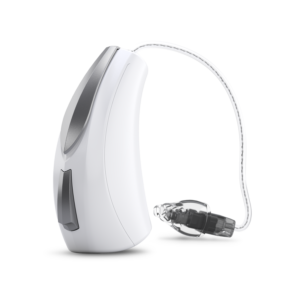
- Rechargeable and traditional battery options
- Warranty varies based on clinic where you purchase hearing aids
- Financing available
- 30-day, risk-free trial
Cost
$2,800 – $7,500 depending on provider and associated fees
Overview
To get an idea of whether you suffer from hearing loss, Starkey offers an online hearing test. But in order to buy hearing aids, you’ll have to schedule an appointment with a hearing specialist for a follow-up hearing test to see if you they are indeed what you need. Starkey believes an in-person assessment from a doctor or audiologist is the best way to determine what type of hearing loss you have and the best way to treat it.
Many Starkey hearing aids are equipped with Bluetooth capabilities so you can stream television and music. They also offer rechargeable and traditional battery models, depending on your preference. Starkey has incorporated artificial intelligence (AI) into its Evolv AI. Along with being able to track your activity and fitness through the app, the Evolv AI can also detect a fall and will contact loved ones for you through the app. That makes the Evolv AI our pick for best safety features.
Phonak Naida Paradise
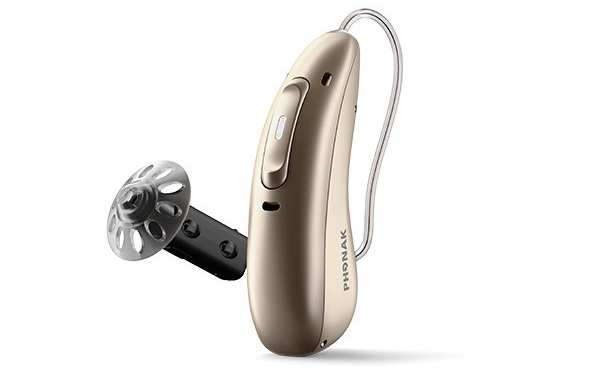
- 45-day, risk free trial
- Warranty varies based on clinic where you purchase hearing aids
- Financing available
- Doctor visit required
- Rechargeable and traditional battery options
Cost
$2,400 – $7,000 depending on provider and associated fees
Overview
Phonak has a wide variety of hearing aids that cover a wide range of issues. They offer an online hearing test but believe an in-person consultation is the best way to assess your hearing loss and determine the device that’s right for you.
Phonak offers several different models, but if you suffer from severe or profound hearing loss the Phonak Naida Paradise is a good choice. It fits behind-the-ear and is Bluetooth-enabled. And depending on the model you choose; you can get speech enhancement or noise cancellations features. Phonak also offers a hearing aid that’s waterproof, as well as one that’s completely invisible to everyone around you.
ReSound
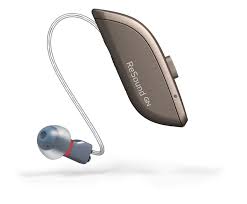
- 45-day, risk-free trial
- Online hearing test
- Doctor visit required
- One- to three-year warranty, depending on model
- Financing available
Cost
$1,250-$7,000 depending on provider and associated fees
Overview
Resound offers 25 different hearing aids that cover everything from mild to severe hearing loss. ReSound’s hearing aids are heavy on features. The app allows you to control more than minor adjustments – you can manage tinnitus and save locations so your hearing aids will automatically adjust to environments you return to over and over.
Most hearing aid companies offer rechargeable models, but the ReSound One model has a long battery life when compared with others. It can last for more than 30 hours on a three-hour charge and is our pick for best rechargeable hearing aids
Eargo Neo HiFi
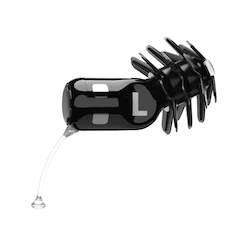
- Online hearing test
- No doctor’s visit required
- Free, lifetime support
- Financing available
- 45-day, money-back guarantee
- Rechargeable models only
- One-year warranty
Cost
Eargo Neo HiFi – $2,500
Overview
Eargo is another hearing aid company that follows a direct-to-consumer business model. There are several options available, but one thing that makes Eargo unique is all of their hearing aids are nearly invisible to those around you. They sit inside your ear canal, are all rechargeable, and adjustable through the mobile app.
There is a hearing test on Eargo’s website, but it’s optional. You don’t have to take the test to buy hearing aids from them. All their hearing aids are best for mild to moderate hearing loss and fit completely in your ear canal. Our favorite option is the Neo HiFi – it can be adjusted manually by simply tapping your ear twice.
How Does Buying Hearing Aids Online Work?
Online shopping has become many people’s first choice for shopping, although buying hearing aids online may still seem odd. But they are widely available and many of the companies that offer hearing aids online work on a direct-to-consumer model.
Part of the reason many people don’t buy hearing aids is because of the cost. Online hearing aid companies are trying to lower the cost of the devices by selling them directly to you and helping you avoid fees associated with getting them from a hearing center or doctor’s office. Some companies will ask you to take a hearing test online. It works the same way as one inside a doctor’s office. You find a quiet place, put on a pair of headphones, listen to different sounds and pitches and respond based on how well you hear them. Other companies will ask you to submit a doctor-administered test to help you choose the right hearing aid for you.
Once you choose the pair you want, the hearing aids will be sent to your home. There are video tutorials on how to set them up and support staff you can call or email for help. Many companies offer subscription services for things like battery and dome replacement. These companies also generally offer a trial period, usually around 30 days, for you to decide if the hearing aids are right for you. If not, you can usually return them for a full refund.
Do I Need One Hearing Aid or Two?
There are some instances of hearing loss that only affect one ear. You can find out for sure with a thorough hearing test, and if that ends up being the case – you may only need one device for the one ear. When looking for hearing aid options, be sure to check and see if the company sells a single hearing aid or if they only sell them in pairs. Some companies will only sell them as a set.
Does Insurance Cover Hearing Aids?
Does Insurance Cover Hearing Aids? Medical insurance won’t cover the cost of hearing aids. Insurance companies consider hearing aids as an ‘elective’ and don’t cover them. Some companies will offer optional hearing plans you can pay extra for, but you will likely still incur significant out-of-pocket expenses.
Medicare does not cover the cost of hearing aids or fittings either, although Medicare Part B will cover some of the expense of a doctor-recommended hearing or diagnostic test. Medicaid may cover some costs of hearing aids, but it depends on the state you live in.
The exception is if you are a veteran. If an audiologist from the U.S. Department of Veterans Affairs recommends hearing aids for you – they will be free.
Currently, Arkansas, Connecticut, Illinois, New Hampshire, and Rhode Island require health insurance plans offered in their state to cover the cost of hearing aids.
What Kind of Batteries Do Hearing Aids Use?
Hearing aids are powered with either rechargeable batteries or disposable batteries.
There are three different kinds of rechargeable batteries for hearing aids:
Nickel-Metal Hydride Rechargeable Batteries
This type of batteries has been used in hearing aids for more than 10 years. They have to be recharged frequently and replaced every year.
Silver-Zinc Rechargeable Batteries
This technology is newer than the nickel-metal type. They will generally last for 24 hours before needing to be recharged. They are also removable, so you can take the battery out and charge it, and use a spare, fully-charged battery in its place. This battery is recyclable and will need to be replaced every year.
Lithium-Ion Rechargeable Batteries
These are the types of batteries used in laptops, smartphones and certain medical devices. They will last for 24 hours without needing to be recharged. You can’t remove the battery, so the whole hearing aid will need to sit on the charger. Lithium-ion batteries are sealed in your hearing aids because they have toxic materials in them and can present a fire hazard when damaged. The battery will last around six years – after that you will have to replace the entire device.
Some hearing aids work on traditional, disposable batteries:
Zinc-Air Button Disposable Batteries
These batteries are the most common, traditional ones used in hearing aids. They are air-activated, so when you pull the sticker off the back of the battery it becomes activated. They come in four different sizes – 10 (yellow), 312 (brown), 13 (orange), and 675 (blue). Each size has a color code associated with it to make it easy to remember which one you need.
Most standard batteries last between five and 14 days, depending on how long you wear them. The average time of battery life is based on 16-hours of wear a day.
- Size 10 (yellow) – lasts three to seven days
- Size 13 (orange) – lasts six to 14 days
- Size 312 (brown) – lasts three to 10 days
- Size 975 (blue) – lasts nine to 20 days
Which Is Best – In-Person Testing or Online Testing?
The internet has made so many things possible, including taking a hearing test online. Many companies have good hearing tests that you can take from the comfort of your home. They are simplified versions of in-person testing and can give you a good assessment of whether you need further testing. The results are reasonably accurate but aren’t as detailed as they would be from a doctor’s office.
A hearing test in an audiologist’s office is comprehensive and can determine the exact cause, degree and type of hearing loss you have. The information obtained in a doctor’s visit can help customize the settings on your hearing aids and make them fit your needs.
Even if you end up buying hearing aids online, it’s still best to seek a professional hearing test for the information you need to make the most informed choice.
Conclusion
A simple internet search will show there are a wide variety of hearing aids to choose from. If you’ve started to have trouble hearing and want to see if you need one, look for features that are important to you. Can you see it? How long does the battery last? Is it Bluetooth-enabled? Hearing aids are expensive, so you want to ensure you pick just the right brand and model for your specific needs.


